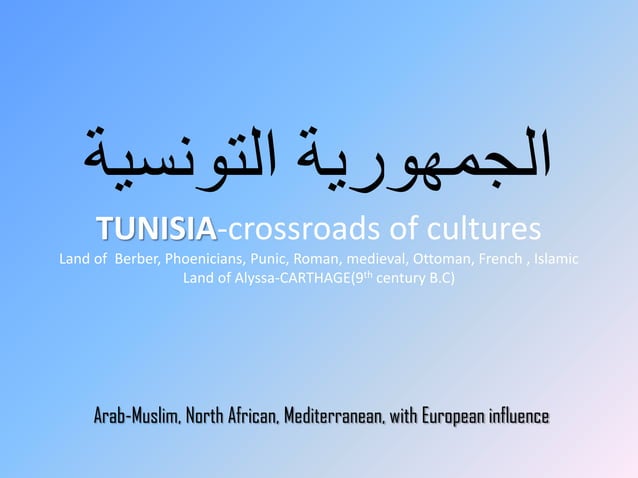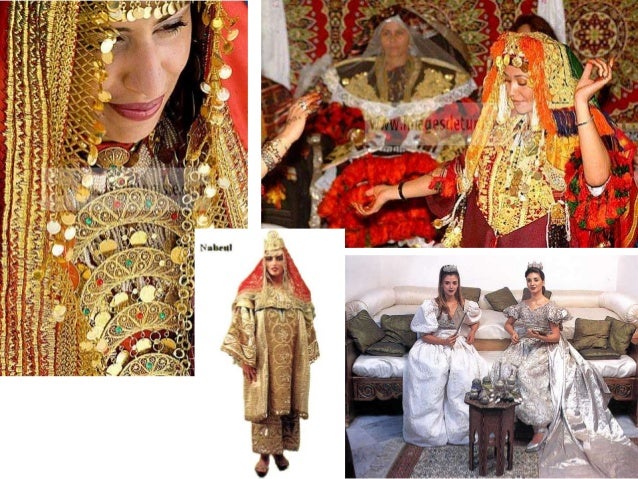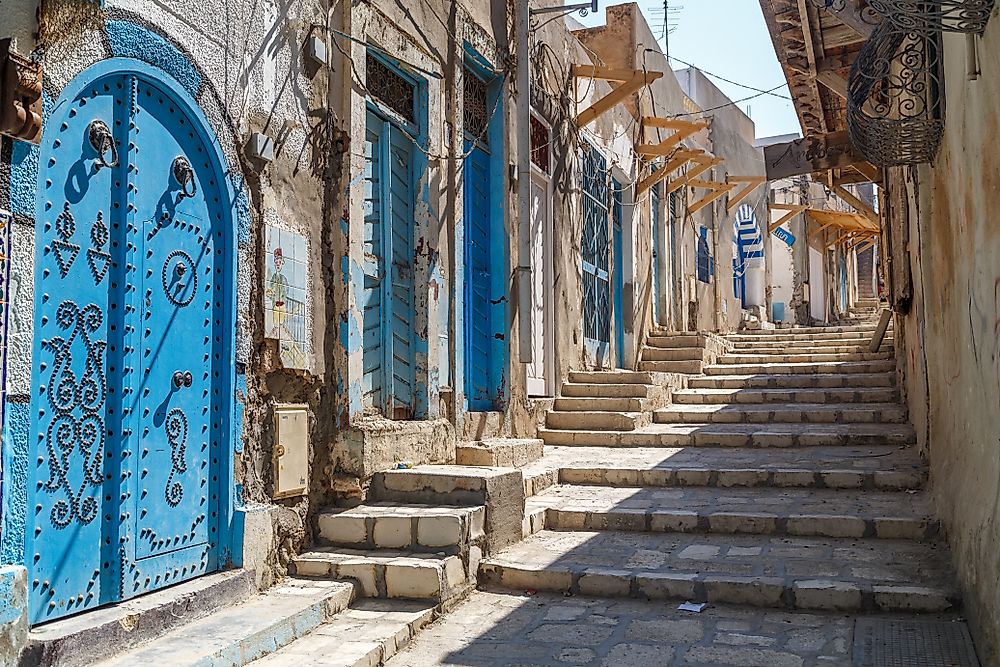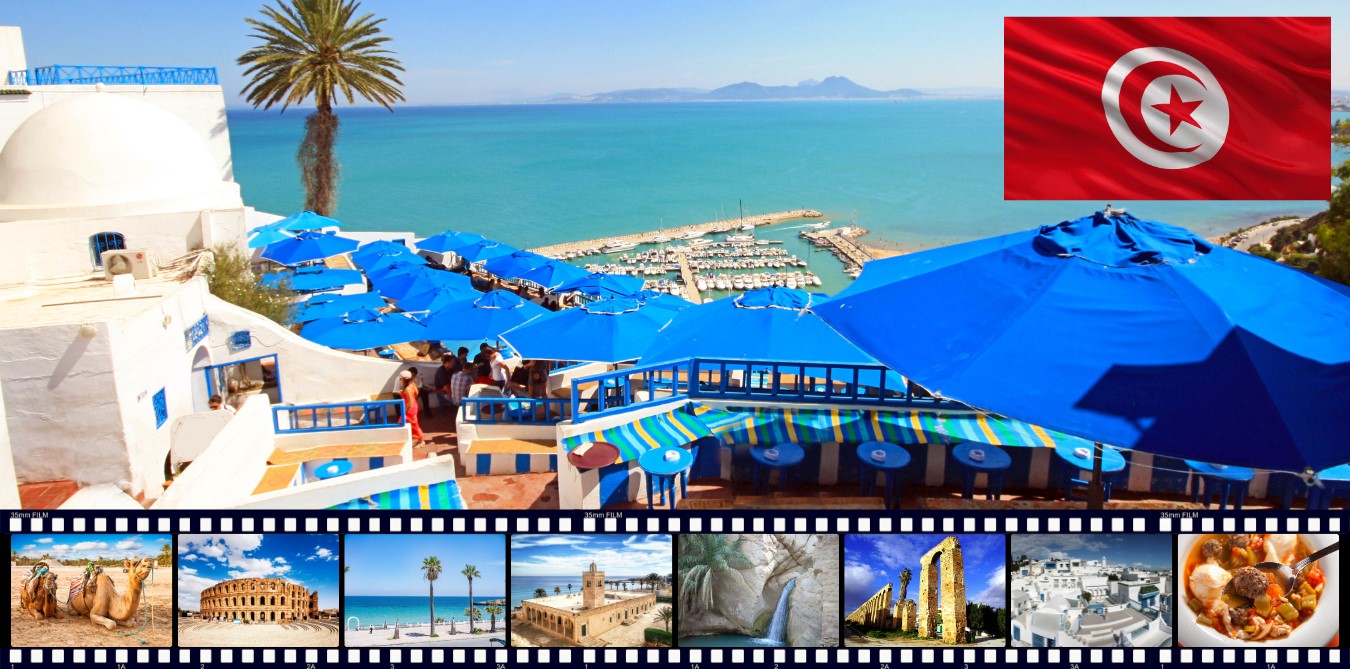Tunisia: A Crossroads of Cultures on the Mediterranean
Related Articles: Tunisia: A Crossroads of Cultures on the Mediterranean
Introduction
With great pleasure, we will explore the intriguing topic related to Tunisia: A Crossroads of Cultures on the Mediterranean. Let’s weave interesting information and offer fresh perspectives to the readers.
Table of Content
Tunisia: A Crossroads of Cultures on the Mediterranean

Tunisia, a North African nation nestled on the Mediterranean coast, holds a captivating blend of ancient history, vibrant culture, and breathtaking natural beauty. Its strategic location at the crossroads of Europe, Africa, and the Middle East has shaped its unique identity and rich tapestry of influences.
A Geographic Overview
Tunisia occupies a prominent position on the northernmost tip of Africa, bordered by Algeria to the west and Libya to the south-east. Its Mediterranean coastline stretches for over 1,300 kilometers, offering stunning beaches, turquoise waters, and picturesque islands. The landscape varies from the coastal plains and fertile valleys to the vast Sahara Desert in the south.
A Land of Contrasts: Exploring Tunisia’s Diverse Regions
- The North: This region is characterized by rolling hills, lush forests, and fertile valleys. The mountainous Rif region, a UNESCO Biosphere Reserve, offers breathtaking landscapes and diverse flora and fauna. The ancient city of Dougga, a UNESCO World Heritage Site, showcases Roman architectural marvels.
- The Center: The central region is home to the fertile plains of the Sahel, known for its agricultural production. The capital city of Tunis, a bustling metropolis, reflects the country’s rich history and cultural diversity.
- The South: The south is dominated by the vast Sahara Desert, a landscape of endless sand dunes and oases. This region is sparsely populated but offers unparalleled opportunities for adventure and exploration.
A Historical Journey Through Time
Tunisia’s history is a testament to its strategic importance and the influence of various civilizations. The Phoenicians established trading posts along the coast, followed by the Romans, who left an indelible mark on the country’s architecture and culture. The Arab conquest in the 7th century brought Islam and a new cultural era. Tunisia was a significant center of Islamic learning and trade during the Middle Ages. The Ottoman Empire ruled the country for centuries, leaving behind a legacy of architectural and cultural influences. In the 20th century, Tunisia gained independence in 1956, ushering in a new era of self-determination.
Cultural Tapestry: A Blend of Traditions and Modernity
Tunisia boasts a vibrant culture, a fusion of Arab, Berber, and European influences. Traditional music, dance, and crafts are integral parts of everyday life. The country is also known for its delicious cuisine, a blend of Mediterranean flavors and spices. Tunisian society is a blend of tradition and modernity, with a growing emphasis on education and economic development.
Tourism: A Gateway to Discovery
Tunisia is a popular tourist destination, attracting visitors from all over the world. Its diverse attractions include:
- Historical Sites: Ancient Roman ruins, medieval mosques, and traditional souks offer a glimpse into the country’s rich past.
- Beaches and Islands: The Mediterranean coastline offers pristine beaches, crystal-clear waters, and opportunities for water sports.
- Natural Wonders: The Sahara Desert, the Chott el Djerid salt lake, and the mountainous Rif region offer breathtaking natural beauty.
- Cultural Experiences: The vibrant cities of Tunis, Sousse, and Hammamet offer a taste of Tunisian culture, including traditional music, dance, and cuisine.
Economic Landscape: A Growing Economy
Tunisia’s economy is based on agriculture, tourism, and manufacturing. The country has a strong agricultural sector, producing olives, citrus fruits, and dates. Tourism is a significant contributor to the economy, generating employment and foreign exchange. Tunisia has also made progress in manufacturing, particularly in the automotive and textile sectors.
Challenges and Opportunities
Tunisia faces several challenges, including economic inequality, unemployment, and political instability. However, the country has also made significant progress in recent years, implementing reforms to promote economic growth and social development.
FAQs about Tunisia
- What is the official language of Tunisia? Arabic is the official language, but French is widely spoken.
- What is the currency of Tunisia? The Tunisian dinar (TND) is the official currency.
- What is the best time to visit Tunisia? The best time to visit Tunisia is during spring (March-May) and autumn (September-November) for pleasant weather.
- Is Tunisia safe for tourists? Tunisia is generally safe for tourists, but it is always advisable to be aware of your surroundings and take precautions.
- What are some of the must-see attractions in Tunisia? Some of the must-see attractions in Tunisia include the ancient Roman ruins of Dougga, the Medina of Tunis, the Sahara Desert, and the beaches of Djerba.
Tips for Traveling to Tunisia
- Obtain a visa: Most nationalities require a visa to enter Tunisia. Check the visa requirements for your nationality before traveling.
- Learn a few basic Arabic phrases: This will be helpful for interacting with locals.
- Respect local customs: Dress modestly when visiting religious sites and be aware of local customs and traditions.
- Bargain in the souks: Haggling is expected in the souks, so be prepared to negotiate prices.
- Try the local cuisine: Tunisian cuisine is delicious and diverse. Be sure to sample some of the local dishes.
Conclusion
Tunisia is a fascinating country with a rich history, vibrant culture, and breathtaking natural beauty. Its strategic location at the crossroads of Europe, Africa, and the Middle East has shaped its unique identity and rich tapestry of influences. Visitors to Tunisia can explore ancient ruins, relax on pristine beaches, and experience the warmth and hospitality of the Tunisian people. Despite facing challenges, Tunisia is a country with a promising future, poised to continue its journey of progress and development.








Closure
Thus, we hope this article has provided valuable insights into Tunisia: A Crossroads of Cultures on the Mediterranean. We appreciate your attention to our article. See you in our next article!